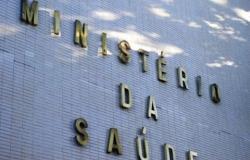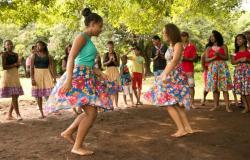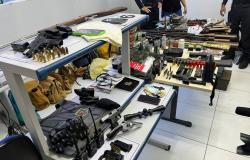
The act brought together politicians and social movements in the center of RioRenan Areias / Agência O Dia
Published 04/01/2024 18:04 | Updated 04/01/2024 22:03
Rio – An event on Rua da Recção, in the center of Rio, this Monday (1), marked the 60th anniversary of the military coup in Brazil and served to rescue the memory of the victims of the dictatorship, defending the democratic regime in the country. The event, with the participation of various social and political movements, also made references to Marielle Franco. Afterwards, the group went to the National Law School (FND) building, where a ceremony will take place to award the Chico Mendes de Resistência medals, offered by the Tortura Nunca Mais Group.
To the DAYfederal deputy Jandira Feghali (PCdoB), who was present at the event, spoke about the importance of remembering the moments lived during the dictatorial period with the aim of reinforcing democracy.
“When we recover our memory after 60 years, many generations were numbed in this process, because the school doesn’t talk about official history, the curriculum doesn’t talk about official history, nobody does, so some generations didn’t know the details of what happened. This vision of military intervention, a new dictatorship, still has a basis in society, even with all the barbarities that were committed against the people and the country. Every country that has gone through this seeks to recover the history and data so that people can take awareness that this can no longer happen. Having a museum is for people to learn about history and incorporate the democratic feeling of freedom”, he explained.
Asked about the expectation of greater support from President Lula (PT) for the act, the parliamentarian stated that she prefers to judge the PT member based on his record and not just on an isolated day. Furthermore, she highlighted the president’s work in favor of democracy.
“As Lula is a democrat, people expected him to mark this moment with force. He decided to take the government out of it, on this date only, but he did not disallow everything he was going to do: expropriate the House of Death, build the museum in São Paulo… We cannot judge a person by an attitude, we have to judge by their history. Lula has a history in defense of democracy, even now on the 8th. He was a political prisoner”, he commented.
State deputy Dani Balbi (PCdoB), who was not at the event, highlighted the importance of creating a museum in the building that housed the Department of Political and Social Order (DOPS) in the leaden years. The space would come to be called the State Museum of Memory and Truth. The project has been in progress in the Legislative Assembly of Rio (Alerj) since last year. “Every year we ‘decommemorate’ the military dictatorship. It is an important act so that we never forget everything that happened. But having the State Museum of Memory and Truth would be a milestone in the country’s history,” she explained.
Rafael Maul, president of the Tortura Nunca Mais Group, highlighted that memory also plays the role of stopping problems in today’s society that bear traces of the military dictatorship.
“Today’s act is fundamental to thinking about the country’s memory, but mainly that we think about an active memory, a memory that can actually produce significant transformations, that does not just remain a matter of the past. There is no memory that should not be raised, quite the opposite. Any erased memory only helps us maintain the worst things we have in our society. Our memory is still very partial, it does not look at various social groups that were affected by the dictatorship and other processes of State violence in Brazil. A more expanded memory will help so that things that happen today can no longer happen. Torture exists today, state violence exists today, segregation, racism”, highlighted Maul.
Finally, indigenous leader Ana Kariri criticized the event’s organizing committee for not being invited to speak during the event. Furthermore, she recalled that “Rio de Janeiro is indigenous land”.
At FND, the honorees were the Boycott, Divestment, Sanctions & Stop the Wall campaign; Gonzaguinha (in memoriam); Disobedient Stories (Argentina); Leonel Moura Brizola (in memoriam); Maria Criseide da Silva and Wellington Marcelino Romana; Norberto Nehring (in memoriam); Pastor Mozart Noronha; Quilombolas of Sapê do Norte (ES); and Ranúsia Alves Rodrigues (in memoriam).
*Reporting by intern Giovanna Machado, under the supervision of Thiago Antunes
Tags: Event center Rio marks years military coup rescues memory victims Rio Janeiro
--




